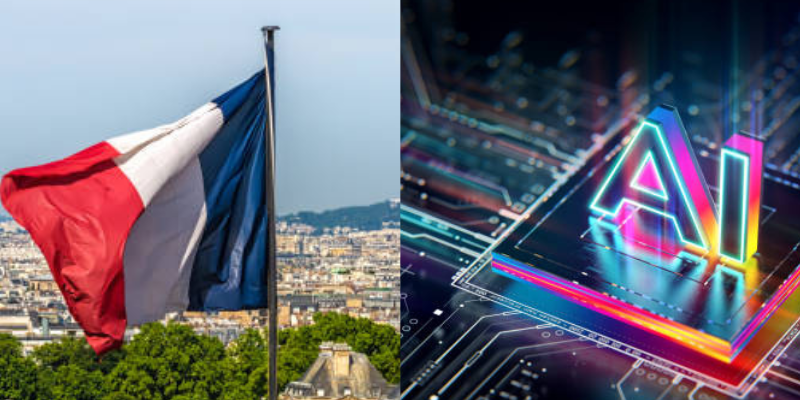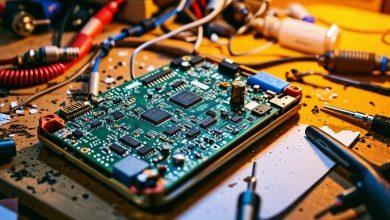France Aims To Become Global AI Leader

France’s progress as a leader in AI was a hot topic of conversation at last week’s Viva Technology conference in Paris.
TakeAway Points:
- The Viva Technology conference in Paris last week was buzzing with talk about how far France has come as a leader in AI.
- French AI startup H generated $220 million in funding, including major U.S. e-commerce player Amazon. This caused a lot of talk.
- The boost U.S. tech companies have given France’s AI scene—Microsoft and Amazon alone have invested billions in the nation—was a recurring subject.
Viva Technology conference
The French artificial intelligence company H, formerly known as Holistic, generated a lot of talk after raising $220 million in a seed round of funding from investors that included Google’s billionaire ex-CEO Eric Schmidt and the US internet giant Amazon.
The addition of powerful U.S. tech companies to their shareholder lists is a recurring motif among French artificial intelligence enterprises that receive substantial funding.
The largest-ever pledge from Microsoft to date, 4 billion euros ($4.4 billion), was the driving force behind the influx of fresh private investments that France received earlier this month.
Viva Tech has AI everywhere
AI permeated every aspect of Viva Tech. There was an entire avenue called “AI Avenue,” which was bordered by US IT companies like Salesforce and AWS, past the big, vivid pink “VIVA” sign facing the front.
There was generative AI everywhere, even from unexpected organisations.
For instance, at a sizable booth close to the centre of the Porte de Versailles conference venue, French beauty giant L’Oreal showcased “BeautyGenius,” an AI-powered beauty assistant.
The success of Viva Tech has taken on symbolic significance for France in its aim to become a preeminent hub for AI and technology capable of competing with the likes of China and the United States.
“France is the leader on artificial intelligence in Europe,” Bruno Le Maire, France’s finance minister, said at Viva Tech last week.
He made clear that, while France has a helping hand from U.S. tech giants, “we want to have our own artificial intelligence being created and being developed in France.”
Referring to Microsoft’s investment in France, Le Maire said, “Microsoft is very welcome in our country. But the challenge for us is to have our own devices, our own scientists, and we are working very hard for that.”
France has a robust ecosystem for AI research and development, including top universities and important facilities like Google’s AI research hub in Paris and the Facebook AI Research centre from Meta.
“France stands as one of Europe’s most vibrant innovation hubs,” Etienne Grass, the France managing director of Capgemini Invent, the digital innovation arm of Capgemini, said.
“The nation nurtures a thriving startup scene, marked by significant strides in AI,” Grass added.
While France has a strong history in academia and research, Imran Ghory, a partner at Blossom Capital, said that the country has had difficulty attracting top personnel to “excellent enterprises.”
AI labs from Meta and Google have “created a training ground for students and researchers to learn what leading tech companies look and work like from the inside,” Ghory said.
“We’re now seeing the fruits of this as many researchers and AI engineers begin spinning out their own companies.”
Vying for tech leadership
In an interview last week, French President Emmanuel Macron said that his nation was “leading the tech industry in Europe.” But he pointed out that Europe is “lagging behind” the United States and that additional “strong players” are needed on the region.
“It’s insane to have a world where the big giants just come from China and the U.S,” Macron said at the Elysee Palace. He praised Mistral, the French AI firm backed by U.S. tech giant Microsoft, and H.
To discuss how to establish Paris as a global hub for AI, Macron met last week in the Elysee with a number of influential figures in the field, including Google’s senior vice president of tech and society James Manyika, former CEO Eric Schmidt, and top AI scientist Yann LeCun of Meta.
Maurice Levy, the CEO of Publicis Groupe, a massive advertising and PR agency, said that he believes France has a chance to rank among the top five nations in the world for AI development. According to Levy, France is “determined” to close the AI gap that exists between the US, China, and Europe.
In a TV interview last week, Levy stated that France “can be part of the five biggest countries on AI in the world,” following the United States, China, Israel, and the United Kingdom. He cited H’s massive fundraising round as evidence of the current momentum around French AI.
Levy stated that around 40% of the tech demos at Viva Tech were AI. AI is “something which is … not only taking off, but has already taken off quite massively,” he said.
Google’s Manyika stated during a fireside chat last week that the company has been drawing a lot of its ideas from French engineers.
He said that a significant portion of the lightweight, open-source Gemma AI model that Google just unveiled was created in the company’s AI facility in Paris.
Dealroom data indicates that in 2023, French funding for AI startups accounted for over 20% of all European funding, which is higher than the 15% average for AI startups throughout the European Union.
According to Dealroom, U.K. companies are raising more than twice as much money in AI and GenAI than French companies are, so France is not the top in Europe for AI.
Regulation Versus innovation
According to Macron of France, Europe’s task is to accelerate AI research and development while simultaneously enacting regulations at the “right size.”
The EU passed the AI Act last week, a historic piece of legislation governing artificial intelligence.
Tech CEOs cautioned that overly stringent regulations could impede Europe’s efforts to advance artificial intelligence. The EU AI Act has drawn criticism from some nations, including France, for being overly restrictive when it comes to innovation.
Chief innovation officer of Capgemini, Pascal Brier, stated that although regulation is necessary to prevent AI from growing too strong, it is also critical to make sure that new regulations like the AI Act do not unintentionally “kill” innovation.
According to him, authorities should not apply the “principle of precaution,” which states that AI developers should generally refrain from taking actions that could be harmful.
“There’s no way you can stop AI — it’s only the end of the beginning. It’s not going to stop there.” Brier said.





